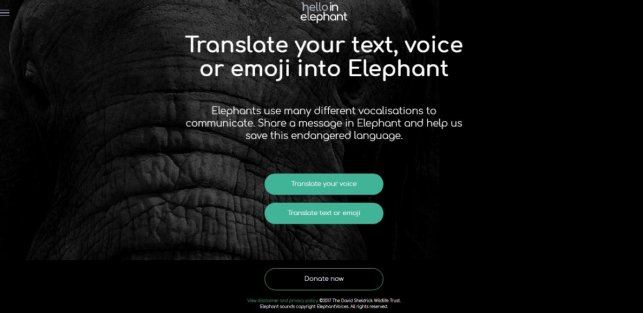
David Sheldrick Wildlife Trust, ElephantVoices, and whiteGrey Australia joined forces in launching a website called 'Hello in Elephant' in commemoration of the World Elephant Day on August 12.
The Drum reported that the website uses voice recognition technology to translate voice messages into the Elephant Language. Text inputs and emojis can be translated using the website too.
According to a video posted by David Sheldrick Wildlife Trust on YouTube, elephants have one of the most human-like languages in the animal kingdom.
"Elephants are so like us and they [do] many of the same behaviours and characteristics as humans do even down to their language which you can translate," David Sheldrick Wildlife Trust Executive Director Robert Brandford said in the video.
In the website, it is stated that the project is designed to raise awareness and drive donations for the African elephants.
"The Elephant Language is endangered, so we've translated it to help save the species. Through this campaign's celebration of this magnificent animal, we hope to raise greater awareness of the elephant's plight and funding for our pioneering elephant rescue and conservation projects," Dr Dame Daphne Sheldrick was quoted saying in the Drum report.
Sheldrick is the founder of the David Sheldrick Wildlife Trust, a group facilitating several rehabilitation programmes for elephants.
To recall, there are currently around 400,000 elephants left roaming across the globe. In the early 20th century, there was an estimated total of 10 million African elephants. Some scientists believe that by 2025, only 190,000 will remain.
ElephantVoices, an end-product that resulted from its CEO Petter Granli and Dr Joyce Poole's extensive four-decade study into elephant communication and behaviour, played an important part in the development of the website.
The translations made by the website came from Poole's team who have used sound recording equipment to put on tape vocalisations made by elephants found in Kenya.
In the FAQs section of the website, it is stated that one of the biggest threats elephants face is the high demand for ivory that leads to poaching.









